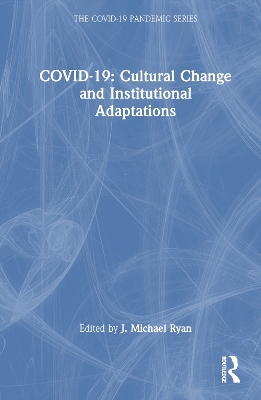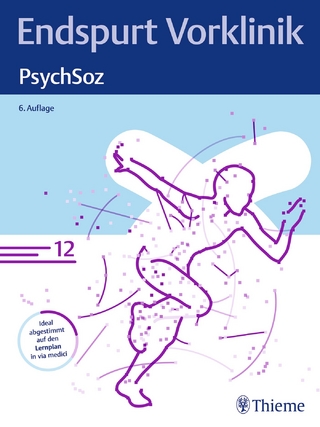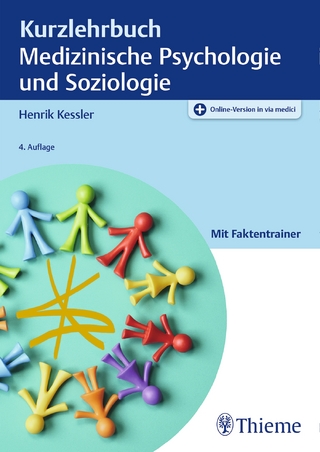
COVID-19: Cultural Change and Institutional Adaptations
Routledge (Verlag)
978-1-032-29904-4 (ISBN)
COVID-19: Cultural Change and Institutional Adaptations provides critical insights into the impact of the pandemic on the relationship between cultures and institutions.
The scholarship presented in this volume examines such important issues as the impact on health-care workers, changes in the interaction order, linguistic access, social stigma, policing, new understandings of social class, and the role of misinformation. Brought together, these insights can help us better understand both the micro- and macrochanges that have been brought about by the pandemic.
Drawing on the expertise of scholars from around the world, the work presented here represents a remarkable diversity and quality of impassioned scholarship on the impact of COVID-19 and is a timely and critical advance in knowledge related to the pandemic.
J. Michael Ryan is an award-winning teacher who has held academic positions at top-ranked universities across five continents. He is currently Associate Professor of Sociology at Nazarbayev University (Kazakhstan) and has previously held academic positions in Egypt, Portugal, Ecuador, and the USA. Before returning to academia, Dr. Ryan worked as a research methodologist at the National Center for Health Statistics (which is part of the Centers for Disease Control and Prevention) in Washington, DC where he led multiple projects aimed at improving national statistical survey methodology. He is the author (with Serena Nanda) of COVID-19: Social Inequalities and Human Possibilities (Routledge 2022) and (co-)editor of more than 15 volumes, including COVID-19: Global Pandemic, Societal Responses, Ideological Solutions (Routledge 2021), COVID-19: Social Consequences and Cultural Adaptations (Routledge 2021), and Core Concepts in Sociology (Wiley 2019). He is also the founding editor of Routledge’s The COVID-19 Pandemic Series.
1. Introduction 2. COVID-19, Cultural Changes, and Institutional Adaptations 3. The Importance of Culture in Understanding the COVID-19 Pandemic 4. COVID-19 and Transformations of the Interaction Order: Erosion, patternization, and de-ritualization of social interactions 5. Did the Pandemic Teach us Something New about Class?: COVID-19 as an experiment in ‘geo-social class’ interests 6. Linguistic Access, Belonging, and Symbolic Power during the COVID-19 Pandemic 7. Halting the Process: COVID-19 disrupting migrant women's empowerment 8. Health Care Workers During the COVID-19 Pandemic: A comparative USA-Poland analysis 9. COVID-19 and the Contagion of Social Stigma: Evidence from India 10. The Fast and Slow Violence of the COVID-19 Pandemic on Asians in the USA 11. "My Body, My Choice!": COVID-19 misinformation consumers as a counterculture 12. Resisting Rules, Challenging Cops: Dilemmas of pandemic policing in a state of emergency 13. The World Health Organization and COVID-19: Testing the international health regulations in a global pandemic
| Erscheinungsdatum | 29.12.2022 |
|---|---|
| Reihe/Serie | The COVID-19 Pandemic Series |
| Zusatzinfo | 4 Tables, black and white; 3 Line drawings, black and white; 6 Halftones, black and white; 9 Illustrations, black and white |
| Verlagsort | London |
| Sprache | englisch |
| Maße | 156 x 234 mm |
| Gewicht | 1400 g |
| Themenwelt | Sachbuch/Ratgeber ► Gesundheit / Leben / Psychologie |
| Studium ► 1. Studienabschnitt (Vorklinik) ► Med. Psychologie / Soziologie | |
| Studium ► Querschnittsbereiche ► Prävention / Gesundheitsförderung | |
| Sozialwissenschaften ► Pädagogik ► Bildungstheorie | |
| Sozialwissenschaften ► Soziologie | |
| ISBN-10 | 1-032-29904-5 / 1032299045 |
| ISBN-13 | 978-1-032-29904-4 / 9781032299044 |
| Zustand | Neuware |
| Informationen gemäß Produktsicherheitsverordnung (GPSR) | |
| Haben Sie eine Frage zum Produkt? |
aus dem Bereich


